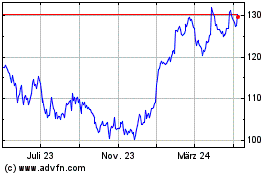CEOs Consider Ways to Smooth the Presidential Transition, Including Holding Back Campaign Money
06 Januar 2021 - 4:04PM
Dow Jones News
By Emily Glazer and Chip Cutter
In a virtual gathering of chief executives convened to discuss
political turbulence stemming from the 2020 election, leaders of
some of the largest U.S. companies said they were considering
withholding donations to Republican lawmakers seeking to impede the
presidential transition.
During an hourlong meeting Tuesday, a group of about three dozen
chief executives discussed divisions in the country, efforts to
thwart the presidential transition and what voice they thought
business should have in politics, according to people who
participated in the conversation. Some business leaders who have
donated to Republican campaigns stated that they were considering
withholding future political contributions to elected officials who
have said they would oppose certifying the Electoral College
results for President-elect Joe Biden, those people said.
Among business leaders on the call were Walt Disney Co.
Executive Chairman Robert Iger, a noted Democrat who has indicated
interest in an ambassador role under the Biden administration;
Accenture PLC Chief Executive Officer Julie Sweet, a Republican who
has donated to Sen. Ted Cruz; and Merck & Co. CEO Ken Frazier,
who publicly broke with President Trump in 2017, but has donated to
candidates from both parties, including Senate Majority Leader
Mitch McConnell. The gathering included about a dozen advisers,
such as former Obama administration Homeland Security Secretary Jeh
Johnson and Anthony Scaramucci, who served briefly in the Trump
administration but has more recently been a critic of the
president.
The gathering, along with a letter sent by nearly 200 CEOs on
Monday urging Congress to accept the election results, marks a
shift in tactics for business leaders, some of whom are joining
forces to take newly strident positions on politics rather than
speaking out individually. Other business groups, including the
U.S. Chamber of Commerce and the Business Roundtable, have also
issued statements this week calling for a smooth transition of
power.
Also in the meeting, people familiar with the gathering said,
were Goldman Sachs Group Inc. Senior Chairman Lloyd Blankfein, a
Democrat, and Deloitte CEO Joseph Ucuzoglu, who doesn't disclose
his political affiliation, both of whom donated to Republicans in
recent years. The discussion began with a conversation about
political instability in the country, the people said.
About halfway through, the executives began discussing potential
actions they could take to help ensure a smooth presidential
transition, some of the people said. The group discussed
withholding political contributions, which some viewed as more
meaningful than public statements, they said.
Some executives in attendance said they would reconsider hiring,
business and investments in states whose officials were fighting
the transition, some of the people said.
"We have to create some level of cost," said Thomas Glocer, a
former CEO of Thomson Reuters Corp., and a director at Merck and
Morgan Stanley, who attended Tuesday's meeting. Mr. Glocer, a
registered Democrat, says he has voted for candidates in both
parties. "Just coming out with another public letter isn't going to
do much. Money is the key way."
Mr. Glocer said a debate among the CEOs in attendance Tuesday
and in conversations leading up to the call centered on how to most
effectively persuade lawmakers to uphold the rule of law. Some
executives could withhold campaign contributions to senators
opposing the Electoral College results, for example. But executives
also discussed working behind the scenes, trying to influence
lobbyists and those close to elected officials. Though some
lawmakers see opposition from CEOs as a point worth celebrating,
"money is something they do care about," Mr. Glocer said.
Most business leaders are reluctant to hold back campaign
contributions or bring political matters into the boardroom, but
many now feel there is little choice, Mr. Glocer said. "Respect for
the rule of law underlies our market economy," he added. "Business
leaders need to stand up on these issues because in the end they
are business issues, not just politics as usual."
A group of Republican senators say they plan to object to the
Electoral College votes Wednesday, pushed by President Trump to
challenge a contest that was won by Mr. Biden. By law, Congress
must hold a joint session Jan. 6 to ratify Mr. Biden's 306-232
Electoral College win. Majorities in the House and Senate would
have to agree for the challenge to succeed, an extremely unlikely
prospect given that Democrats control the House and Republican
party leaders have opposed the effort.
Business leaders are often active political donors to both
parties. Mr. Cruz, the Texas senator who is spearheading the
Republican senators' efforts, has received millions from hedge fund
operator Robert Mercer and fracking billionaires Dan and Farris
Wilks, The Wall Street Journal has reported.
Jeffrey Sonnenfeld, a Yale School of Management professor,
convened the meeting along with an earlier virtual gathering of
business leaders shortly after the election. Mr. Sonnenfeld, who
has critiqued the Trump administration at times but remains close
to some officials, said the CEOs said Tuesday they also plan to
review investment practices, reconsidering staffing decisions and
facilities in states where officials are impeding the
transition.
Write to Emily Glazer at emily.glazer@wsj.com and Chip Cutter at
chip.cutter@wsj.com
(END) Dow Jones Newswires
January 06, 2021 09:49 ET (14:49 GMT)
Copyright (c) 2021 Dow Jones & Company, Inc.
Merck (NYSE:MRK)
Historical Stock Chart
Von Mär 2024 bis Apr 2024

Merck (NYSE:MRK)
Historical Stock Chart
Von Apr 2023 bis Apr 2024
